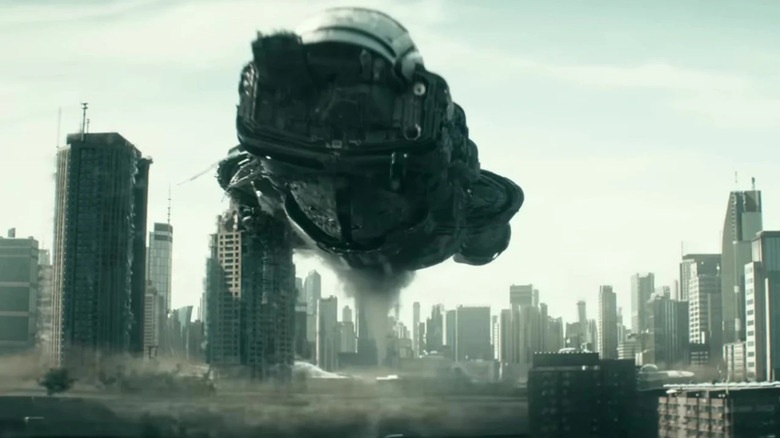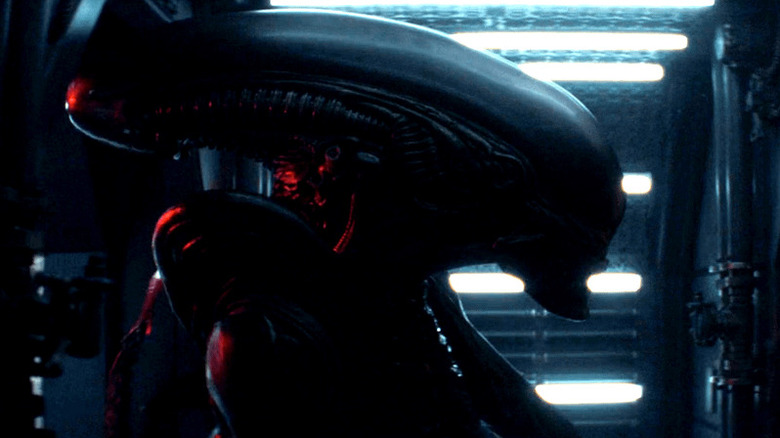One Alien: Earth Spaceship Could Foreshadow The Future Of The Series
Spoilers ahead for the latest episode of "Alien: Earth."
Noah Hawley's "Alien: Earth" is remarkable for several reasons, one of which is that it doesn't seem (so far) to be all that concerned with being a prequel to the "Alien" movie franchise. To be sure, it's not attempting to stray all that far away, either; set two years before "Alien," the series is clearly attempting to have its visual aesthetic stick closely to Ridley Scott's 1979 film. Nowhere is this more apparent than the production design of the USCSS Maginot, the ship whose doomed mission and crash landing on Earth kicks off the action in the show. While Hawley and the series' other directors certainly impose their own distinctive shooting and cutting styles on their episodes, the production design and lighting of the Maginot deliberately and constantly recall the Nostromo from Scott's movie. Indeed, references to "Alien" have come to feel par for the course for the property, especially after last year's "Alien: Romulus" was chock full of nods to just about every other "Alien" movie ever.
Yet, "Alien: Earth" may have additional reasons for keeping the Maginot so similar to the Nostromo. For one thing, Hawley appears to be inviting numerous direct comparisons between the characters and situations in "Earth" with the "Alien" films. For instance, the only survivor of the Maginot is Morrow (Babou Ceesay), a person who loses a child while off in space and is seen by the Weyland-Yutani corporation as expendable, all of which makes him remarkably similar to Ellen Ripley. For another thing, the series does appear to be addressing aspects of "Alien" lore not previously expanded upon by the movies. One of these topics is the hierarchy and political situation on Earth itself, especially with regard to the Weyland-Yutani corporation and its continuing influence. So, while "Alien: Earth" certainly seems to be primarily concerned with its own self-contained characters and storyline, it may be planning to explain how Weyland-Yutani became such a majority power in the future of the "Alien" franchise, and the Maginot's mission might be the key.
The meaning of the Maginot
Even before digging into where the name Maginot comes from, the choice of the name itself breaks with "Alien" tradition a little. The majority of spaceship names in the "Alien" universe derive from the works of Joseph Conrad, thanks to Scott choosing the name Nostromo for the first film's ship, which was taken from Conrad's 1904 novel of the same name. When James Cameron made "Aliens," he continued Scott's Conrad homage and took the name Sulaco from a town in the same novel for his film's main ship. Although "Alien 3" doesn't take place in a spaceship, the Company vessel sent to retrieve Ripley is called the Patna, which is a ship in Conrad's novel "Lord Jim." From there, the Conrad references ended for a time, with "Alien: Resurrection" calling its ship the Auriga after a constellation (and it's not a Weyland-Yutani vessel, anyway), and the ships in "Prometheus" and "Alien: Covenant" having eponymous names, which highlight those films' interest in religious mythology. "Alien: Romulus" had it both ways; its primary space station is named for Roman mythology figures Romulus and Remus, and the spaceship in the film is called the Corbelan, which is the name of yet another character in Conrad's "Nostromo."
For "Alien: Earth," Noah Hawley purposefully avoids naming its spaceship after a Joseph Conrad character, which indicates that the ship's given moniker has more weight than one might expect. The name Maginot is very likely a reference to the real life French Minister of War during the 1920s, André Maginot, a man who was most famous for instigating a project known as the Maginot Line. This project sought to establish fortifications, obstacles, and weapon installations to prevent Nazi Germany from invading during the early days of World War II. Unfortunately, the Line was not completed as planned, and it had enough weaknesses that German soldiers were able to flank it, which helped lead to France's invasion and Allied forces requiring evacuation. In short, the failure of the Maginot Line resulted in disaster, enough that the name itself came to mean "a defensive barrier or strategy that inspires a false sense of security." Thus, the USCSS Maginot in "Alien: Earth" was doomed as soon as it was christened, and a Xenomorph getting loose on the craft and causing it to crash land in the middle of a populated city shouldn't have come as much of a surprise to Weyland-Yutani.
Could the world be heading for corporate war in Alien: Earth?
But while the name Maginot could simply be a cheeky reference to the ship's ill-fated journey, there's potentially another reason for its name, one which Weyland-Yutani may have actually intended. Although the Maginot's mission (which, unlike the Nostromo's, seems to have been openly communicated to its crew) to obtain and transport Xenomorph eggs to Earth is one that's basically been Weyland-Yutani's primary interest within the entire "Alien" franchise, we've never gotten a succinct explanation for why the Company wants the Alien so badly. Sure, the notion of an unscrupulous corporation wanting to corner the market on a bioweapon doesn't need too much elaboration, but "Alien: Earth" paints a larger political picture than mere corporate greed. We're told in a scene from episode 4, "Observation," that the old world's system of individual governments "didn't work" and that five corporations came into power instead: Prodigy, Weyland-Yutani, Threshold, Dynamic, and Lynch. While we haven't seen much of the latter three companies in the series (yet), the obvious competitiveness and animosity between Prodigy and Weyland-Yutani implies that relations between The Five are not all that friendly.
Seeing as how the USCSS Maginot obtained not just the Xenomorph but four other ravenous, aggressive alien species, it seems like Weyland-Yutani is doing more than just collecting or building a zoo. Five killer alien organisms and five major corporations could be Hawley making an ironic allegory, but it could also indicate that Weyland-Yutani is actively preparing for war with the other corporations, and it has decided to make these deadly creatures its primary weapons, perhaps because of their history with the Prometheus and Covenant missions. After all, we still don't know where all these species were taken from; maybe the Maginot visited Planet 4 after the Covenant, or perhaps David 8 eventually made it to Origae-6 and did some more twisted scientific experimenting there. All we know from future "Alien" installments is that Weyland-Yutani appears to have a majority control over the Earth, operating places like Gateway Station and being so ubiquitous that characters refer to it simply as "the Company" and not as one of The Five. Additionally, although Prodigy's hybrids appear to be a priority for Kavalier (Samuel Blenkin) solely for his own amusement, it's possible that he's secretly considering them as his company's primary weapon in a coming conflict, too. Whatever the case may be, it's a safe bet that in the future of the "Alien" universe, people will end up screaming, whether they're in space or on Earth.
New episodes of "Alien: premiere Tuesdays on FX and FX on Hulu.


